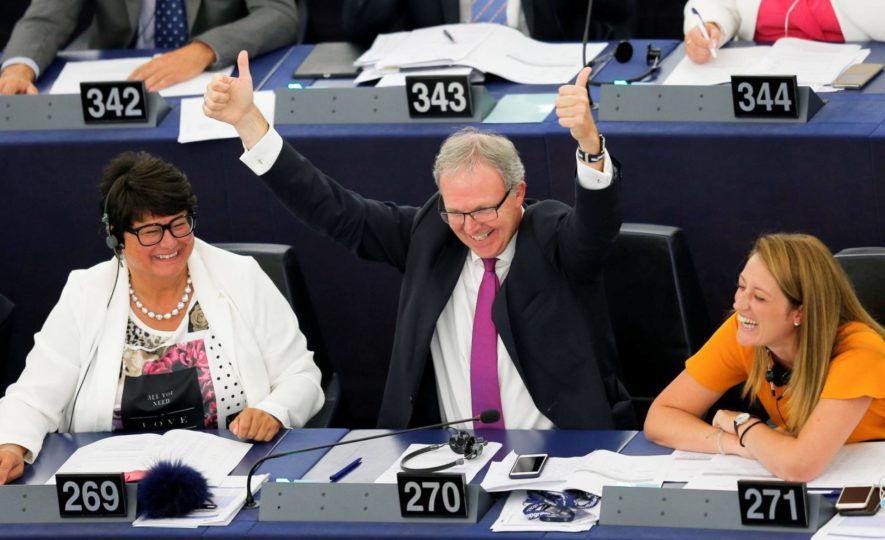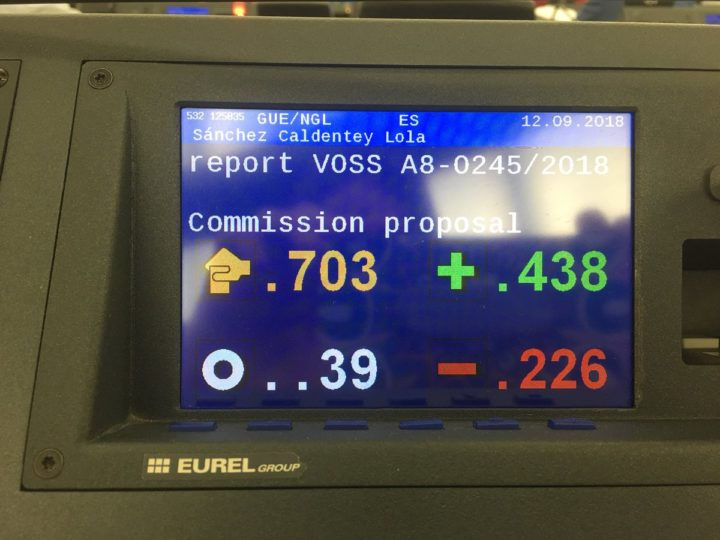Remuneration rights for Internet Creators: 438 for, 226 against and 39 abstentions
- Sep 12, 2018
- 4 min read
The controversial text, approved with 438 votes in favor and 226 against, goes a step further to become a directive.

Axel Voss MEP celebrates the victory of the reform in Strasbourg on Wednesday. VINCENT KESSLER REUTERS
A revolution for copyright, in just two months. The European Parliament approved yesterday by a large majority the proposal for copyright reform on the Internet: 438 deputies in favor, 226 against and 39 abstentions. The front led by Axel Voss, popular MEP and rapporteur of the initiative, defends the urgency of amending the current directive, 2001, and protect creators with more guarantees and fair compensation against the giants of the Internet. benefit from the dissemination of their works. And defeated the side of MEP Julia Reda, Pirate Party, who believes that the reform does not help artists and puts at risk the freedom on the Internet.

A radical turnaround compared to last July: then, the same European Parliament rejected the regulation by 40 votes, between shouts and applause of celebration. Yesterday, the joy came to Voss, who celebrated the result with grimaces and thumbs up.
But what has changed in such a short time? Everything, apparently. Or maybe not much. Because the vote, tense and long due to an infinity of amendments, yesterday supported the two articles -11 and 13-which made the text fall this summer and concentrated all the controversies, in one of the most bitter battles that the European Parliament remembers. In July, the campaign for “not” overwhelm the side of the “yes” with its massive mobilization: before the second vote, the defenders of the reform responded with an equally effective pressure.
Article 11 creates a related right for press editors to authorize or prohibit online news aggregators (such as Google News) from reproducing their media publications and deciding if they want to charge for it. The proposal does not affect the links, not even if they are accompanied by a few words, but the fragments of news (the snippets) and their use by commercial platforms.
Article 13, the main source of disputes, states that the portals that store, optimize and disseminate user content for commercial purposes (such as YouTube) are responsible for what Internet users upload. To date, they are only obliged to a posteriori control, when a violation of copyright is indicated. The reform aims to obtain a license from the owners of the content and implement “appropriate and proportionate measures” to avoid housing protected works without authorization.
For critics, after that definition, only previous filters can be hidden to control millions of contents, something that they criticize as technologically and economically unviable, as well as bordering on censorship. Its defenders emphasize instead that the article includes exceptions, for small companies or blogs, that memes and parodies will not be affected, and that complaint and rescue mechanisms are guaranteed for content that is unfairly eliminated.
The fight lasted until the last moment. The Ministers of Culture of almost a dozen European countries, including Spain, signed a joint declaration to support the reform. Its supporters – hundreds of famous European artists have supported the directive – defend that it provides more power to creators who use the Internet to disseminate their works, and see it as a way to protect cultural heritage. The two major Spanish parties, PP and PSOE, supported the measure; Podemos and IU opposed, and in Ciudadanos there was no unanimity.
The Spanish Socialists in the Euro Parliament believe that the Internet can not be a territory without law: they defend that press editors have the right to fair remuneration for the dissemination of their publications. And they are favorable for platforms such as YouTube, Pinterest, SoundCloud, Vimeo, Flickr or Tumblr to pay creators for the content protected by copyright that Internet users upload. But not everyone sees it that way. “It is a shame. The European Parliament has introduced censorship of content on the Internet. We entered a stage of Orwell’s Big Brother, “said Italian Vice President Luigi di Maio, of the 5-Star Movement.
If the directive goes ahead, Internet giants such as Facebook and Google may be forced to share part of their income with the creative industry, although the impact on their accounts has not yet been quantified. Edima, the organization that brings together digital platforms in the EU, criticized the decision yesterday. It believes that it will restrict the news that users can share, and has warned that it will prevent them from uploading certain content.
Other detractors believe that the legislative change opens the door to preventive censorship. “Now it may be an illegal piece of music, but in the future it may be opinions. We need to pay the creatives, what can not be is that the algorithms decide what appears on the Internet and what does not, “warned the German Social Democrat MEP Tiemo Wölken.
After the approval, the MEPs voted in favor of giving free rein to the report for the so-called trialogue phase: the European Parliament, the Commission and the European Council will seek to agree on a definitive version that will have to go through the Strasbourg vote again to become a directive. The European elections, in May 2019, hurry institutions.
Source: https://elpais.com

Comments